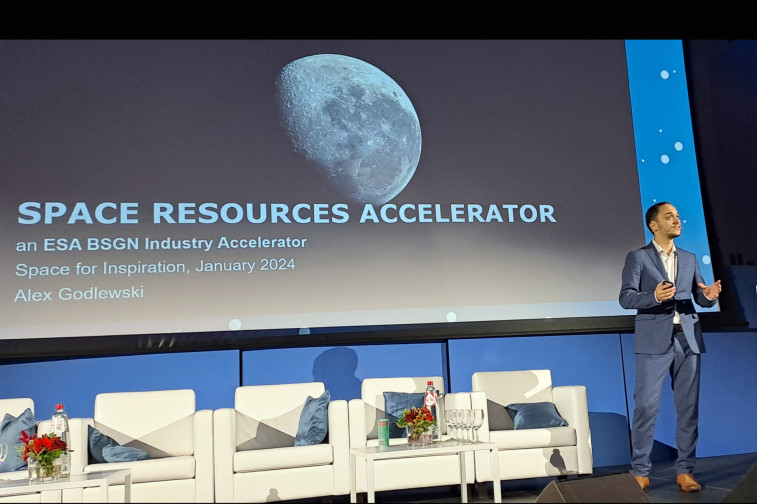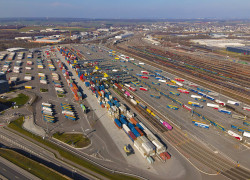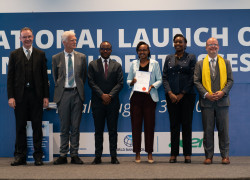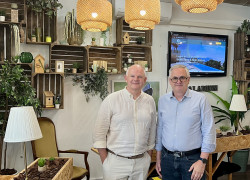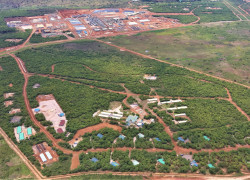Launch of a new Space Resources business accelerator
The European Space Agency (ESA) mandates the European Space Resources Innovation Centre (ESRIC) to conceptualize with a network of partners the world’s first business accelerator dedicated to the lunar economy.
The Space Resources Accelerator has been presented by Alexander Godlewski, newly-appointed Business Accelerator Officer, at ESA’s Space for Inspiration conference, an awe-inspiring B2B annual gathering that unites visionaries, entrepreneurs, innovators, and investors at the forefront of commercial space exploration. This year’s focus was on Low Earth Orbit (LEO) and lunar economies. The accelerator is an initiative of the European Space Agency (ESA) and is part of the BSGN Industry Accelerators network. The programme aims to accompany the Moon champions of tomorrow; more specifically, it is dedicated to scale-ups with demonstrated successful business models in terrestrial and/or space markets and with the capacity to develop applications for the emerging lunar economy. The accelerator is currently in the conceptualization phase and the European Space Resources Innovation Centre (ESRIC) is inviting partners to join the initiative in the coming months, with the implementation of the project expected for 2025.
“In 2021, ESRIC launched the Start-up Support Programme, the world’s first incubator programme entirely dedicated to early-stage ventures in the space resources domain. With the new Space Resources Accelerator, ESRIC will provide a pathway for partners with commercial projects to accelerate their activity in this dynamic and forward-facing field. Extensive research capabilities and state-of-the-art facilities make ESRIC an international centre of excellence and a leader in the field of space resources.“ states Kathryn Hadler, Director of ESRIC
In the last couple of years, the Moon has gathered considerable attention, with eight countries so far having landed on, orbited or flown by the Moon[1]. In our race to the stars, our natural satellite represents a realistic objective compared to the more ambitious one of Mars, playing a foundational role to prepare the next missions to the red planet. With NASA’s Artemis Programme bringing back astronauts to the Moon as soon as 2026, we may soon witness one of the most powerful and inspiring achievements of humanity. This time though, the aim is to build a presence on our natural satellite and thousands of humans could follow, eventually living permanently on the Moon. This endeavor will generate a strong demand for multiple applications across energy, healthcare and construction in which commercial players will play an increasingly important role.
“We need to accelerate the development of a sustainable lunar economy, and supporting commercial projects is a key step forward in this direction. The aim is to bring such projects to terrestrial demonstration in markets that are already available on Earth today and ultimately to the Moon. The model that we are proposing provides the right balance. ESA will make available funding to support the growth of commercial solutions that are supported by credible business cases, allowing to bring on-board private investors to support these ventures.” declares Francesco Liucci – Innovation Management Officer at ESA.
With an estimated €170 billion[2] cumulated market value and close to 2 million[3] jobs created in the next 15-20 years, the lunar economy represents an outstanding longterm economic opportunity which is heavily backed by governments. The next decade will be marked by over 200 lunar missions. Sign that the Moon has become the new priority for space agencies, out of the annual $26 billion space exploration market, investments in Moon-related projects will more than double between 2013-2022 and 2023-2032, representing nearly half of the total budget allocation[4]. The Moon race has started and the frontrunners of today will turn into the champions of tomorrow.
As a significant contributor to technology development, space exploration is also expected to generate numerous spill-over effects in materials science, manufacturing, robotics, and data analytics notably. Examples of inventions from space agencies which spined-off to the industry are countless: portable computers, home insulation, scratch-resistant lenses, freeze dried food, and even athletic shoes to name a few[5] . Similarly, commercial solutions with a terrestrial application could enable space and lunar economies, thus allowing innovations “made for” space agencies to give birth to everyday products.
“50 years ago, portable computers, camera phones and wireless headsets did not exist and yet all these products have been invented by space agencies to support space exploration, eventually becoming the products we know today. Our accelerator precisely aims to enable such innovations to come to life from public-private partnerships. We aspire to build today with ESA the success stories of tomorrow.” explains Alexander Godlewski.
The Space Resources Accelerator aims to attract a wide range of stakeholders, starting with institutional partners which are interested alongside ESA to sustain space exploration efforts by collaborating with the private sector to build a human presence on the Moon. It also targets potential strategic partners interested in boosting their innovation roadmap to address the new challenges faced by space agencies with our next frontier – the Moon. Over the last couple of years, many pioneering projects – from lunar rovers to habitats and propellants – have involved space agencies and commercial players from automotive, construction and energy sectors notably. This programme ambitions to serve as a catalyst to strengthen such public-private cooperation. Finally, by de-risking ambitious projects backed by ESA, the accelerator constitutes an attractive platform for investors to finance successful businesses addressing terrestrial and/or space use cases with capabilities to seize the upside potential of an entire new economy in the making.
“In a context in which fundraising is particularly challenging, we are building a win-win ecosystem whereby scale-ups can secure public funding while sustaining space exploration efforts resulting in innovations. This endeavor would also bring solutions to the Moon and back to Earth, thus attracting private investors. The lunar economy offers an exciting environment to experiment with various technologies, and we are looking forward to working alongside our future partners and support the next Moon trailblazers.” highlights Alexander Godlewski.
Communiqués liés
RSA launches technology and management liability insurance s...
RSA Luxembourg, part of Intact Insurance Specialty Solutions, today announces th...
Lancement d'une nouvelle connexion intermodale entre Bettemb...
CFL multimodal a le plaisir d'annoncer le lancement de sa nouvelle connexion i...
Experts from LUNEX award first micro-credentials in Rwanda o...
The Rwanda Ministry of Education (MINEDUC) formally inaugurated Syllabi, a publi...
ERG Notes that ENRC Secures Landmark Victory as Court of App...
Eurasian Resources Group (ERG), a leading diversified natural resources group he...
LetzToken et La Vie est Belle annoncent leur partenariat ouv...
«?LetzToken?», plateforme de tokenisation pionnière basée à Luxembourg, et ...
ERG announces a Pre-Export Finance Facility Agreement based ...
Eurasian Resources Group (“ERG”, “The Group”), a leading diversified nat...
Il n'y a aucun résultat pour votre recherche

